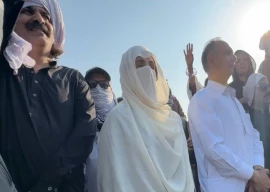
It was a pleasant 28 degrees Celsius, with scattered clouds, when the general inspected the newly renovated, pristinely polished marbled gardens at Jinnah’s mausoleum in Karachi.
He was “happy to be in the city [he] loved,” on an otherwise uneventful September morning, not aware that on the other side of the globe, “yet another event involving aircrafts” was about to alter the course of his life, and the course of Pakistan.
“Little did I know that we were about to be thrust into the front line of yet another war, a war against shadows,” recalls the then-president of Pakistan General (retd) Pervez Musharraf.
Initial reaction: the F word
Musharraf was “horrified and shocked” when the reality of what had happened, hit him. Images of smoke from burning aircraft fuel and the dust and debris from two of the tallest buildings in the world made him instinctively utter “the four-lettered word of condemnation.”
The initial thoughts were ominous. In a great blow to its ego, the world’s most powerful country had been attacked on its own soil, with its own aircraft. America was sure to react violently, like a wounded bear.
“If the perpetrator turned out to be al Qaeda,” Musharraf thought, “that wounded bear would come charging straight towards us.”
First stop: the Governor House in Karachi, where the foreign office advised him to give a statement.
He scribbled one quickly and announced on national television that Pakistan “condemned this vile act, [was] against all forms of terrorism and stood with America at this appalling time.”
The threatening call
The notorious phone call came in next morning when Musharraf was chairing a meeting at the Governor House.
The military secretary informed the general that the US secretary of state Colin Powell was on the phone.
“I said I would call back later but he insisted that I come out of meeting and take the call,” says Musharraf.
It was in this call that Powell uttered the infamous “you are either with us or against us” remark.
“I took this as a blatant ultimatum … [but] we did not negotiate anything,” he says.
Musharraf was also threatened that “if Pakistan was against the US, then it should be prepared to be bombed back to the Stone Age.”
Analysing the cards
“I made a dispassionate analysis of our options, weighing the pros and cons,” says Musharraf.
The only viable option the US had to attack Afghanistan was through Pakistan. “If we did not agree, India was ever ready to afford all-out support,” he says, adding that a “US-India collusion would obviously have to trample Pakistan to reach Afghanistan. Our airspace and land would have been violated.”
The economic dimension of confronting the United States also needed serious analysis. Pakistan’s major export and investments are to and from the United States and the European Union. Any sanctions on these would have crippled our industry and choked the economy.
China also has serious apprehensions about al Qaeda and the Taliban along with other Muslim countries, including Turkey and Iran. The UAE and Saudi Arabia – the only two countries other than Pakistan that had recognised the Taliban regime – had become so disenchanted with the Taliban that they had closed their missions in Kabul.
List of demands
On September 13, 2001, the US ambassador to Pakistan Wendy Chamberlain brought to Musharraf a set of seven demands, primarily calling for cessation of all ties with and support for the Taliban regime, and providing unconditional support to US including “blanket overflight and landing rights” and “territorial access to … naval ports, air bases and strategic locations on borders.”
“Some of these demands, such as ‘curb all domestic expressions of support [for terrorism] against the US, its friends and its allies,’ were ludicrous,” says Musharraf.
Asking Pakistan to break off diplomatic relations with Afghanistan was also not realistic, because the US would have eventually needed Pakistan to have access to Afghanistan, at least until the Taliban fell.
As for unrestricted territorial access to US, Musharraf “offered only a narrow flight corridor that was far from any sensitive areas.”
“We allowed the US only two bases – Shamsi in Balochistan and Jacobabad in Sindh – only for logistics and aircraft recovery. No attack could be launched from there,” he says, insisting that Pakistan gave “no blanket permission for anything.”
The demands were taken to the Cabinet and then between September 18 and October 3, Musharraf met with academics, editors, columnists, intellectuals, tribal chiefs, students, and leaders of labor unions to develop a consensus. The decision was also discussed with a Chinese delegation on October 18, he says, adding that he also visited garrison towns and talked to soldiers.
“I am happy that the US government accepted our counterproposal without any fuss,” he says.
In Pakistan’s interest
Retrospectively, Musharraf is unrepentant and feels the decision to ally with the US was “correct” and taken “in the larger interest of Pakistan.”
“The US was not the only casualty of 9/11. The attacks hit Pakistan differently, but with equally savage force … we feel the ramifications to this day,” he says.
“No other country has faced as many threats on as many fronts … [yet] we stood with the US, and we stand with the entire world, in opposing terrorism.”
Published in The Express Tribune, September 11th, 2011.
COMMENTS (11)
Comments are moderated and generally will be posted if they are on-topic and not abusive.
For more information, please see our Comments FAQ




1732626034-0/BeFunky-collage-(92)1732626034-0-165x106.webp)



1732621030-0/Express-Tribune-(7)1732621030-0-270x192.webp)
1732622842-0/Express-Tribune-(9)1732622842-0-270x192.webp)







a most sensible and well thought out decision from president musharraf. while the fallout on pakistan has been bad, much of the negative effects were unstoppable and were largely contained (minus the lal masjid fallout) while he was at the helm. the 2008 elections saw a pretty steep decline in the security situation. in any case, president musharraf 2013!
@jamil akhtar khalid: "frontline state against terrorism" should actually read "frontline state for terrorist" based the Establishments support and nurture of selective elements which happen even today.
Since we are talking Prime ministerial Candidates; I suggest Sharmila Farooqi Shaeeba! Although folks will bring up the corruption charges and plea bargain and everything. She's been through it all and still has the guts to do her job in the present govt. hierarchy. Just look at her persona, the fire in her belly, her belief in a vision of successful Pakistan. Sharmilaji harbour's such aspirations and admires the life of shaheed bibi. I'm sure a strong woman's will to do something for Pakistan will come through. This is a 'real' Candidate not outdated ones like Parvez sahaab and IK and others who think they are hire apparent.
Musharraf was right in making the decision ! If there would be any other politician he would have ruined the whole situation
@jamil akhtar khalid: How would the world be safer? Or do you actually mean to say the world except for the targets of the attackers and its sympathizers? The only way that makes sense is to believe the attack was intended to be a one time thing and even then it means shrugging off the deaths as nothing special.
Musharraf is the only wise guy after Quaid e Azam who cares for Pakistan. Imran khan is good alternative but he lacks experience plus he do not have that much vision as Musharraf. IK start giving statement according to current events happening to Pakistan. He do not have vision.
I wish if Pakistani ppl could open their eyes and chose Musharraf becoz he is the only one who ca take out Pakistan from current situation.
Talk about a series of policy blunders to corner yourself. Pakistan I'm sure is a authoritative case study for students studying 'foreign policy' all over the world.
He had no choice and I agree with the General that he had little options.....but than again what happened with Pakistan losing 35,000 civilians and 8,000 soldiers/policemen and yet to be labelled as either collaborators or incompetent.....our leadership has let us down by not convincing the international community.
the only guy who could and did handle that situation.Since Musharaf its Chaos for Pakistan as noone else is capable enough to control all the fuss. Extremism should be neglected,moderation is a key to success.
I totally agree with the thinking and subsequent actions taken by Musharaf government. The situation that the General was then put in by US was very awkward and any confrontation by Pakistan could be suicidal. I wish the US President and his team could appreciate the trap they had been put in by Al-qaida and not undertaken the destructive path. I think by not reacting the way they did, the US would have kept the World much safer. Pakistan as a front line state against terrorism faced the major brunt and could not escape huge losses and damages. The Country has politically and economically become unstable. Thanks to George Bush and his Advisors.
Being a Pakistani i sometime ask myself what other event if not 09/11 could have Pakistan decision makers and the society think of doing something about the wild growth of religious extremism largely through long investment of our so called Arab friends...